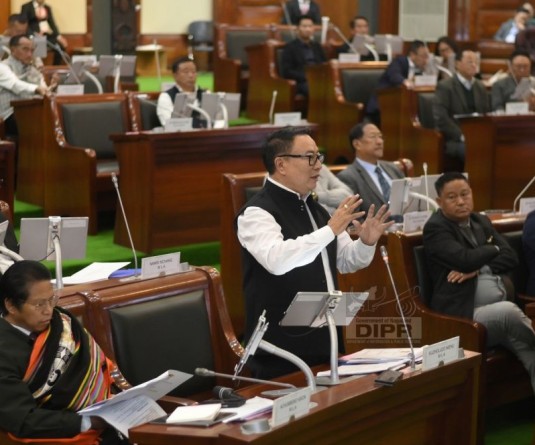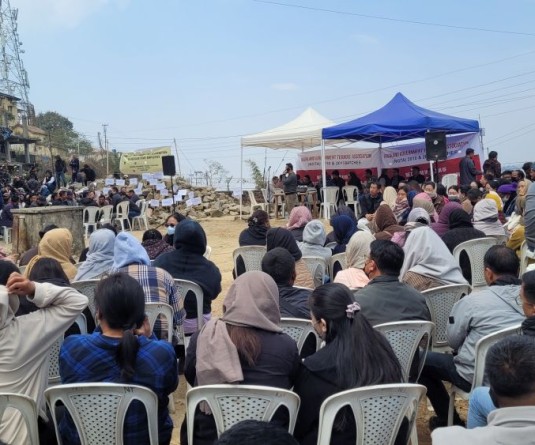
Morung Express News
Kohima | March 15
A national seminar on ‘Gender, Social Justice and Human Rights with special reference to North East’ was held on March 15 at SIRD Conference Hall, Kohima.
Jointly organized by National Human Rights Commission, India and Nagaland University, Kohima campus, Meriema, the seminar focused on two topics ‘Gender Equality is a shared vision of social justice and human rights’ (Academic Session I) and ‘Role of media in Development and Social justice: Special Reference to North East’ (Academic Session II).
The speakers for the first session were Dr. Anuja S, Associate Prof. NLU Bangalore who spoke on ‘Women Empowerment, Focus on North East,’ and Dr. Rosemary Dzüvichii, Head, Department of English & Advisor to NMA who spoke on ‘Gender equality, Role of Women in good governance and development.’
“Why is it that men and women share the same geographical space but women are given a lower status in that same space?” questioned Dr. Anuja while stressing on the essence of women empowerment. Asserting that there can be no success in the world when more than half of the population is not empowered, Dr. Anuja also mentioned that empowerment is not just about economic empowerment but includes sharing of power within the home as well as society.
While the NE women workforce statistics are higher compared to the rest of the country, the question also lies on the type of work, remunerations and whether the economic empowerment leads to women empowerment. “The women are the primary guardians through which the quality and quantity of human resources which promotes sustainable development within society, the social norms or the family norms is transmitted from one generation to another generation and this is where women play a critical role,” stated Dr. Anuja.
Questioning the position of women in governance, Dr. Rosemary Dzuvichu meanwhile posited that good governance must include women in all spheres of development. Unless women come into the decision-making, negotiation table, viewed Rosemary, the “pursuit for peace or development is not possible.” “History teaches us that if we don’t take forward women into the negotiation table, there is a dismal future for us,” she stated, while also emphasizing on the need for women to make a differences in the community without getting diluted in the vicious cycle of corruption and violence.
Reservation, as an international mandate, to bring equity, and gender differences particularly in representation in governance and political structure in relation to societal structures was also stressed. “Most Naga bureaucrats, all of them have come through reserved quotas. These are all reservation, and yet when we talk about a small quota of reservation we literally wage a full-fledged war. When we talk of good governance, it’s about democracy,” said Dr. Rosemary. The way forward, according to Dr. Rosemary is the fusion of tradition and modernity.
In the second session, journalist Bano Haralu spoke on reflections of ‘North East in Media: A dialogue,’ while Dr. Rajiv Ranjan Giri, University of Delhi spoke on good governance, justice and the dream of Gandhi.
Speaking on how media in NE interpret itself within the region and outside, Bano Haralu stated that the issues of the NE region, its aspirations, strives, and sentiments never get reflected. This sense of alienation is not only seen in media space but also in the political, development sphere and other engagements of the region as a whole with the rest of India. However Haralu mentioned that it is essential for media houses in the NE today “to bring to the foreground the issues that affect people through good research, good writing, having the courage to reflect the true situation.”
Haralu believed that with the progress in information technology there is no limit to the exchange of information that can be had. “There is chance and opportunities today to put across all those views. If the challenges of yesteryears was technology, the challenges today as I see it is the willingness to contribute, to make a change; the challenge is of good training grounds, good mass communication schools which provide you with the foundation of looking at journalism not just as an adventure, but to keep the discipline and guidelines and ethics of journalism,” she stated.
Haralu also expressed the need for more media professionals today to engage with the future and to produce journalism which is not just confined to mere reporting but to engage with the community, to communicate the voice of the voiceless, bring justice where justice is denied and provide a sense of history.






